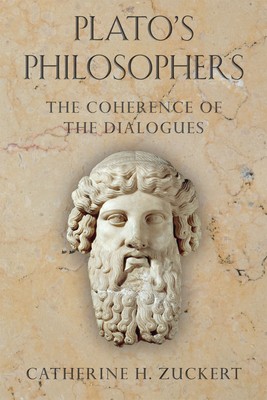
- We will send in 10–14 business days.
- Author: Catherine H Zuckert
- Publisher: University of Chicago Press
- ISBN-10: 022600774X
- ISBN-13: 9780226007748
- Format: 15.8 x 22.9 x 4.6 cm, minkšti viršeliai
- Language: English
- SAVE -10% with code: EXTRA
Reviews
Description
Faced with the difficult task of discerning Plato's true ideas from the contradictory voices he used to express them, scholars have never fully made sense of the many incompatibilities within and between the dialogues. In the magisterial Plato's Philosophers, Catherine Zuckert explains for the first time how these prose dramas cohere to reveal a comprehensive Platonic understanding of philosophy.
To expose this coherence, Zuckert examines the dialogues not in their supposed order of composition but according to the dramatic order in which Plato indicates they took place. This unconventional arrangement lays bare a narrative of the rise, development, and limitations of Socratic philosophy. In the drama's earliest dialogues, for example, non-Socratic philosophers introduce the political and philosophical problems to which Socrates tries to respond. A second dramatic group shows how Socrates develops his distinctive philosophical style. And, finally, the later dialogues feature interlocutors who reveal his philosophy's limitations. Despite these limitations, Zuckert concludes, Plato made Socrates the dialogues' central figure because Socrates raises the fundamental human question: what is the best way to live?
Plato's dramatization of Socratic imperfections suggests, moreover, that he recognized the apparently unbridgeable gap between our understandings of human life and the nonhuman world. At a time when this gap continues to raise questions-about the division between sciences and the humanities and the potentially dehumanizing effects of scientific progress-Zuckert's brilliant interpretation of the entire Platonic corpus offers genuinely new insights into worlds past and present.
EXTRA 10 % discount with code: EXTRA
The promotion ends in 21d.23:42:34
The discount code is valid when purchasing from 10 €. Discounts do not stack.
- Author: Catherine H Zuckert
- Publisher: University of Chicago Press
- ISBN-10: 022600774X
- ISBN-13: 9780226007748
- Format: 15.8 x 22.9 x 4.6 cm, minkšti viršeliai
- Language: English English
Faced with the difficult task of discerning Plato's true ideas from the contradictory voices he used to express them, scholars have never fully made sense of the many incompatibilities within and between the dialogues. In the magisterial Plato's Philosophers, Catherine Zuckert explains for the first time how these prose dramas cohere to reveal a comprehensive Platonic understanding of philosophy.
To expose this coherence, Zuckert examines the dialogues not in their supposed order of composition but according to the dramatic order in which Plato indicates they took place. This unconventional arrangement lays bare a narrative of the rise, development, and limitations of Socratic philosophy. In the drama's earliest dialogues, for example, non-Socratic philosophers introduce the political and philosophical problems to which Socrates tries to respond. A second dramatic group shows how Socrates develops his distinctive philosophical style. And, finally, the later dialogues feature interlocutors who reveal his philosophy's limitations. Despite these limitations, Zuckert concludes, Plato made Socrates the dialogues' central figure because Socrates raises the fundamental human question: what is the best way to live?
Plato's dramatization of Socratic imperfections suggests, moreover, that he recognized the apparently unbridgeable gap between our understandings of human life and the nonhuman world. At a time when this gap continues to raise questions-about the division between sciences and the humanities and the potentially dehumanizing effects of scientific progress-Zuckert's brilliant interpretation of the entire Platonic corpus offers genuinely new insights into worlds past and present.


Reviews